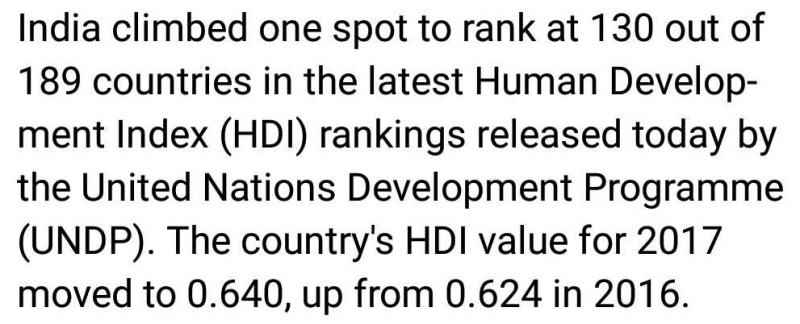Class 10 Exam > Class 10 Questions > What is the HDI rank of India ?
Start Learning for Free
What is the HDI rank of India ?
Community Answer
What is the HDI rank of India ?
HDI Rank of India
India's Human Development Index (HDI) rank in 2020 is 131 out of 189 countries. The HDI is a composite index that measures the achievements of a country in terms of three dimensions of human development: health, education, and income. The HDI rank of India has improved from 135 in 2018 to 129 in 2019, but it has dropped to 131 in 2020.
Health Dimension
The health dimension of the HDI takes into account the life expectancy at birth, which is an indicator of the overall health status of a population. India's life expectancy at birth has improved from 68.3 years in 2010 to 69.7 years in 2019. However, this is still lower than the global average of 72.6 years.
Education Dimension
The education dimension of the HDI measures the average years of schooling and the expected years of schooling. India's average years of schooling have improved from 5.4 years in 2010 to 6.5 years in 2019. However, the expected years of schooling have remained stagnant at 12.3 years since 2014.
Income Dimension
The income dimension of the HDI measures the Gross National Income (GNI) per capita of a country. India's GNI per capita has increased from $1,460 in 2010 to $6,681 in 2019. However, this is still lower than the global average of $17,535.
Challenges
India continues to face several challenges in achieving higher human development. Some of the major challenges are:
- High levels of income inequality
- Poor access to quality healthcare and education in rural areas
- High levels of malnutrition and infant mortality
- Gender inequality and discrimination against marginalized communities
Conclusion
India has made progress in improving its human development over the years, but there is still a long way to go. The government needs to focus on improving access to healthcare and education in rural areas, reducing income inequality, and addressing social and gender inequalities to achieve higher human development.
Attention Class 10 Students!
To make sure you are not studying endlessly, EduRev has designed Class 10 study material, with Structured Courses, Videos, & Test Series. Plus get personalized analysis, doubt solving and improvement plans to achieve a great score in Class 10.

|
Explore Courses for Class 10 exam
|

|
What is the HDI rank of India ?
Question Description
What is the HDI rank of India ? for Class 10 2024 is part of Class 10 preparation. The Question and answers have been prepared according to the Class 10 exam syllabus. Information about What is the HDI rank of India ? covers all topics & solutions for Class 10 2024 Exam. Find important definitions, questions, meanings, examples, exercises and tests below for What is the HDI rank of India ?.
What is the HDI rank of India ? for Class 10 2024 is part of Class 10 preparation. The Question and answers have been prepared according to the Class 10 exam syllabus. Information about What is the HDI rank of India ? covers all topics & solutions for Class 10 2024 Exam. Find important definitions, questions, meanings, examples, exercises and tests below for What is the HDI rank of India ?.
Solutions for What is the HDI rank of India ? in English & in Hindi are available as part of our courses for Class 10.
Download more important topics, notes, lectures and mock test series for Class 10 Exam by signing up for free.
Here you can find the meaning of What is the HDI rank of India ? defined & explained in the simplest way possible. Besides giving the explanation of
What is the HDI rank of India ?, a detailed solution for What is the HDI rank of India ? has been provided alongside types of What is the HDI rank of India ? theory, EduRev gives you an
ample number of questions to practice What is the HDI rank of India ? tests, examples and also practice Class 10 tests.

|
Explore Courses for Class 10 exam
|

|
Suggested Free Tests
Signup for Free!
Signup to see your scores go up within 7 days! Learn & Practice with 1000+ FREE Notes, Videos & Tests.


























